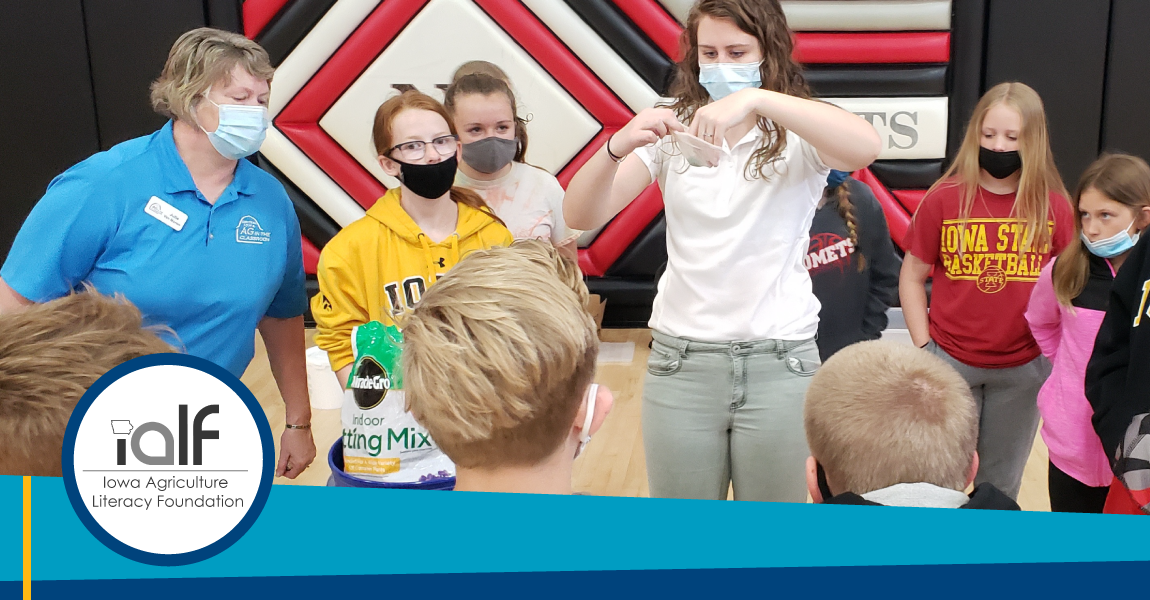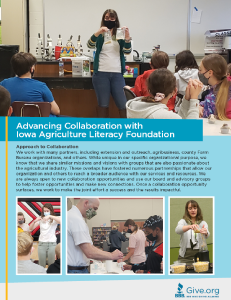
Advancing Collaboration with the Iowa Agriculture Literacy Foundation
About the Organization
The Iowa Agriculture Literacy Foundation's mission is to educate Iowans, with a focus on youth, regarding the breadth and global significance of agriculture. The foundation is a coordinated, statewide approach by business, education, and the agriculture industry, designed to augment and aggregate existing agriculture education efforts while encouraging new efforts that promote agriculture literacy in Iowa schools. IALF's overall goal is to serve as a centralized resource to help increase the knowledge and awareness of today's agriculture and its importance among students.
Featured Guest
Will Fett, Executive Director
Iowa Agriculture Literacy Foundation
Approach to Collaboration
We work with many partners, including extension and outreach, agribusiness, county Farm Bureau organizations, and others. While unique in our specific organizational purpose, we know that we share similar missions and visions with groups that are also passionate about the agricultural industry. These overlaps have fostered numerous partnerships that allow our organization and others to reach a broader audience with our services and resources. We are always open to new collaboration opportunities and use our board and advisory groups to help foster opportunities and make new connections. Once a collaboration opportunity surfaces, we work to make the joint effort a success and the results impactful.
Application of the 9 Considerations for Collaboration
Build Trust
We've spent the last seven years building our reputation as a trustworthy source of materials and a trusted partner. Trust is built with timely responses to inquiries and requests and following through on commitments to partner organizations. We practice good governance by having many policies in place, such as our effectiveness assessment policy that ensures our organization operates with professionalism. We regularly report financial statements to our board members, and our year-end financial documents are public to promote transparency and trust. Our actions over the last seven years have positioned us as the go-to organization for partnership opportunities and have led us to secure federal grants, state grants, private grants, and a variety of other sponsorships.
We see ourselves as a part of a continuum of learning. We regularly layout the vision of moving students from agricultural awareness and agricultural literacy to agricultural education, and ultimately, agricultural advocacy. Our role as the agricultural literacy experts allows us to partner with organizations along this spectrum. We know that this entire process can be a 16-year process (kindergarten to college graduate). We conduct planning sessions on an annual basis but will also be revising our organizational strategic plan this year to shore up a solid long-term plan.
Our collaborations always involve efficient communication, but I also try to schedule regular check-ins and status updates to keep everybody moving forward. In a recent collaboration with Iowa State University Extension and Outreach and Iowa State Education Association, we conducted monthly check-in meetings over four months to develop and implement our Read Across Iowa program. Each partner walked away from these meetings knowing what was expected of them to advance the group and the deadlines associated with that expectation. This process helped ensure that we were ready to launch the program on March 1 after more than four months of planning.
Take Stock
We annually develop an educational program plan that evaluates and then plans for our annual critical programming. This plan addresses multiple target audiences and both confirmed activities and an activities wish-list. We then present the plan to our education advisory council for review and feedback. Once it passes this level of review, the plan is presented to our board of directors for final approval before implementation. This process allows us to examine our strengths and weaknesses annually and engage collaborators and stakeholders in solutions. We also regularly develop impact reports for individual programs, highlighting the strengths and challenges of individual programs.
Start Small
Many of our projects have started small and grown over the years. As an example, we planned to develop six issues of a student reader. But we started by only developing
one. We engaged collaborators – writers, designers, reviews, printers, and ultimately end-users (teachers) with the publication. Over the years, we continued to scale up and developed a full suite of six elementary publications. We then
translated each of those elementary publications into Spanish. The next phase of the project was then to develop three middle school versions of the student reader. This project has taken several years to complete, but it has allowed us to build
confidence in a high-quality end product and foster a willingness to trust with stakeholders, funders, and end-users.
We hold ourselves to a very high standard of program implementation and rely on regular feedback from partners and collaborators. In planning for our teacher professional development workshops, we engage local hosts to help plan and manage logistics. Our process requires us to establish clear timelines and roles. Occasionally, partners have not pulled their weight requiring us to do more work, but we have always ensured quality professional development experiences for teachers. We manage this project through an initial RFP from local hosts and regular check-ins once selected. We have refined the RFP regarding those roles and expectations over the years to ensure all parties understand the goals and the roles they'll play.
Take a Portfolio Approach
Our portfolio consists of several different programs – teacher professional development, lesson plan development, student contests, book development, community events, and more. We have prioritized the train-the-trainer model activities, as those seem to generate the most assets and impact in our overall programming. When it comes to funding partners, we offer this portfolio of options and work closely with them to ensure their company or organization's interests are aligned. As an example, we recently partnered with the CHS Foundation. CHS is cooperative and is very interested in teaching others about the cooperative business model. We identified cooperatives and other business practices as a gap area in the lesson plans and curriculum that we offer. So, we were able to partner with CHS Foundation as the funder and develop a series of lesson plans on cooperatives, entrepreneurship, and other business models that filled our educational needs and aligned to their organizational interests.
Consider Non-Traditional PartnersWe have many different partners that would be considered non-traditional. Read Across Iowa was a huge success for us this past year. We partnered with the Iowa State Education Association, which has programs that focus on literacy issues. Our focus area is agriculture. By making the books agriculturally themed, we combined the agricultural and literacy focus issues into one program. By partnering with Iowa State University Extension and Outreach, we could also make the program fit both formal and informal education. We have also partnered with the Community Foundation of Greater Des Moines to strengthen our strategic plan and developed other partnerships outside our primary issue area.
Keep Your Donors Apprised of Your Collaborations
Communication with donors and other stakeholders is of utmost importance to us. We distribute a quarterly electronic newsletter that highlights collaborative projects and partnerships. We also distribute our annual report to donors that highlights our efforts and ways donors can support us as well as our partners. We are also very active on social media with daily posts about programs, partnerships, and other organizational activities.
Future Collaborations
One area of future collaboration that we plan to explore and further develop is with community colleges and other higher education institutions. We currently partner with some of the teacher education programs in Iowa – but there are more than 30 programs throughout the state. We want to engage more of these professors, colleges, and universities to help train their students before they become teachers. We feel like this could help those students prepare for success in their teaching careers. This project requires us to connect with more than 30 schools and as many as 120 different methods courses instructors. We would like to connect with a funder willing to help us do that – including potentially hiring another staff person who could dedicate themselves to this task.
Conclusion
My most significant piece of advice for other non-profit leaders is to be persistent. Collaboration can only happen when both parties are ready for it. So a 'no' to collaboration might only be a 'no, not right now' rather than a firm 'no.' I think it is essential to be willing to take on the lion's share of the work yourself. Collaboration is great, but it isn't always equal. If you are the leader and driver of the collaboration, that is the role you need to take. Be ready to do the majority of the work. Sometimes, collaborators need us to show them what to do and how to operate. Then in the second year, they'll be more willing to take on further responsibilities.
This article was composed by Rachel Romana Liu.



